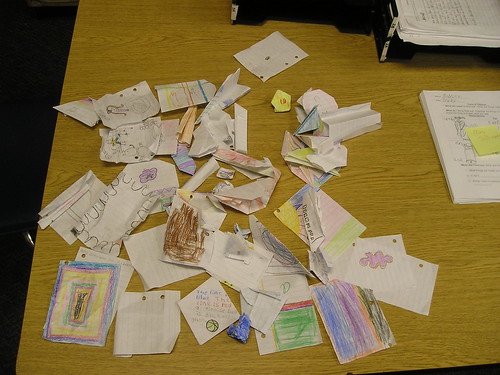Wednesday, October 31, 2007
The Tools of the Future
Tuesday, October 30, 2007
Fearing the Unknown...
I just read a great post by David Warlick. Check it out! The report can also be found here. This report shines a little light on what parents actually know about how their kids are using the internet.
Saturday, October 27, 2007
MEDIA Specialists?
Standing outside yesterday loading our daycare vans in the rain, I began a discussion with a fellow teacher about students and their hobbies. The conversation ended up becoming somewhat of a debate. The quote she added... "Kids today only care about sitting in front of the television with a bag of chips or playing video games". I began by adding my opinions on the differences of the 2 activities.Watching television is a passive activity. It doesn't take
much thought to sit down on a couch and watch a television. One positive attribute of watching television is that one can gain a little knowledge of the world around them, if they are watching intuitive programming.
Playing a video game is an active activity. A child constantly needs to learn, create and rethink their actions through the course of a digital video game. Problem solving techniques are constantly being tossed about. A child doesn't only watch, they have to constantly think of their actions, learn from their mistakes and try new strategies to reach a different outcome.
The teacher, being a Media Specialist, didn't necessarily agree with me. I thought it was quite sad that this media specialist is so disconnected from the students that she teaches. Shouldn't all forms of media be her forte'?
This leads me to believe that we need to look at the function of a media specialist in our schools. I have read posts from other bloggers describing media specialists in other areas of the country. I am aware that there are media specialists that are turning to digital means to teach in their libraries. As the information revolution changes the way we use media, shouldn't the job description of our media specialists change? Has it changed already? If their job descriptions have changed, then why havn't they changed with it?
The only changes that I have seen occur in libraries is the computerized system to check out a book. This is the only change in 20 years. I do not want to generalize, but this is what I am seeing.
There needs to be reform in our libraries. We need to get the media specialist on board. Now, I ask the question... what is your media personnel doing to engage students with the tools of the information revolution?
Thursday, October 25, 2007
Can we ever get it right?
A great post from a great blogger has prompted me to chime in on the topic of curriculum. Curiosity begs me to ask some questions...
Who is writing our curriculum?
Do they actually care about the outcome?
Are they concerned for our students?
Across the board, I feel the answers are concerning. I feel as though they do not have the best interest of the children in mind. If they aren't thinking of the children, who are they thinking of? I can't answer that question. The theme is one of more is better. The more curriculum that we can possibly fit into one school year = better educated students. Being a product of this system, I feel slighted.
Why can't we get it right? Why are those in power blind to the fact that we teach to educate the student, by the best means possible. By definition, this means we give the student the best possible tool to complete the task. We give the student every opportunity to have rich experiences to reflect upon. The current system sets students up to fail. We don't give students enough time and experience to master anything. There is just enough time to be exposed to the information. We expose students to information and expect them to be masters. We wonder why the majority of students would rather be at home on the computer or watching television than be at school. Of course, they have mastered these tools!
Wednesday, October 24, 2007
If you don't want the world to know, then...?
The officer went on to tell us a story about how the County Police arrested several gang members near or around our school. He asked us... "How do you think we caught these gang members?". It was a baited question of course. He just clicked on his next slide to show us these students MYSPACE pages. These students published pictures of themselves on MYSPACE in front of large amounts of illegal drugs and guns in their hands. Needless to say, these students from a local high school were wanted for a number of offenses and were arrested when the officer recognized them on the Internet.
Some people would say that this story is quite laughable. Everyone laughs at the bad guy when they are responsible for getting themselves caught. I think there is a television show about this very idea. I did not laugh at the story though. I think this story scratches the surface of what we as a society are up against right now and in the future. Kids growing up today have to be guided as to the amount of personal information they share with the world.
I know that my school district has a whole team that sits behind computers at the Board of Education Central Office that scrolls through MYSPACE pages all day long. They use these pages to find out about trends in schools, fights that may happen, and illegal activities that may be done by students. They have been very successful at preventing many occurrences from taking place in the past few years.
This gets me to my point. If information is put out there for the world to see, it will be used. We need to teach kids at a young age that if they don't want the information known by the world, don't put it on the Internet. Some get it and some don't.
Sunday, October 21, 2007
A Vision of Students Today
What a great video about how 21st Century students spend their time learning. Interestingly, it seems as though they are spending less time watching television. They have figured out that there are more interesting and meaningful means of acquiring information available today.
How can we expect students to continue to validate attending institutions of learning, when they can seem to do all of the learning on their own with tools in which they already are proficient?
Friday, October 19, 2007
SCRATCH me some...
Wednesday, October 17, 2007
Progress?
The first river that needs to be forged is one of complete and ultimate reform. This "Act" is doing what it is intended to do. The children in our education system that need the most help get pushed along to make our National Report Card appear great. I see this happening every day. We can't continue to lie about the success of our education system. The current protocol is not working.
Our task at hand for educators is to TEACH children. We need to find anything and everything that will motivate these individuals to learn how to learn. Right now, we are teaching children to memorize. We are teaching children that the grades they get, reflect what type of person they are. We teach them that the most important reason they are in school is to pass a test in the Spring. We push them along, even if they do not understand the information we are teaching. The results are accumulative. The students are learning how to be helpless. We make decisions for the students, because we don't trust them to make important decisions on their own.
This effects the students that are the most vulnerable in schools. Until the people that understand the task at hand have positions of power, this will continue.
I am not claiming to know the ultimate solution. I am claiming to be able to recognize the fact that their needs to be a solution, and fast.
The list of students that currently have ADD or some other type of Attention disorder is growing at a staggering rate. Many times I wonder if this problem would still exist if we as teachers could find ways to keep their attention. I know the answer is not constant memorization, boring worksheets, time fillers, and days spent studying for a test to beef up our nations report card.
Thursday, October 11, 2007
No time!
I can't seem to find the time to blog. I have been mixed up between teaching 14 different classes, organizing a Science Fair, parent conferences, running our schools MESA club, grading the labs of my 14 different science classes, feeding and taking care of 2 birds, 2 aquatic frogs, 557 guppies, a red eared slider (turtle), and 2 Jack Dempsy's (fish), and trying to keep up with reading my feeds. Some where in between this I have managed to start a concrete job at my parents house and have been closing pools on the side.
I have some reservations about heading the mandatory MathEngineeringScienceAchievement club at our school. It feels as though it is another attempt by our government to make themselves look like the hero. The mandatory DVD we had to show was filled with the glorification of government jobs. It even came with a complete section of Math Raps about the importance of these jobs.
I don't know how I feel. I will have to get further into the guts of the operation before I form an opinion.
Sunday, September 30, 2007
Editing... revisited
This is a made-up story of course. I was using it as a metaphor for how ridiculous I think some news reports are. A great example of this fear reporting... 3 drinks daily increase risk for breast cancer . I recently saw this report on the news and then looked it up of the Internet. Now, the report says that if a woman is to drink 3 alcohol drinks daily, she increases her risk of breast cancer by 30% or as much as smoking a pack of cigarettes a day. First of all, I don't know any women who drink 3 alcohol drinks a day. If they do drink three drinks a day, they probably already smoke a pack of cigarettes.
This is not the point though. The report did its job. Now everyone equates drinking 3 drinks daily with smoking a pack of cigarettes a day. People go to work the next day like they are intelligent and start barking statistics out that they heard on the news. Now everyone thinks that drinking a few drinks every day is as harmful as smoking a pack of cigarettes a day. The report told you what they wanted to tell you and didn't mention all of the other harmful effects of smoking. The news focuses on the shock value of the report and wants you to watch their station.
This is where editing needs to come into play. As a society, we need to listen, learn, and then decide what is a true and valid study. These statistics may be true, but we as a society need to learn how to question a study and not give so much credit to the reports.
Saturday, September 22, 2007
How creative can you be in 2nd Grade?
This week, I just finished doing a great and simple activity with my 2nd Grade students. We discussed physical properties of objects and how they can be altered/changed. This engagement lesson is the starting point of another lesson in which the students create a paper puppet from an ordinary paper lunch bag.

Wednesday, September 19, 2007
The Wiki Project
After much thought and reflection, I have decided to take the wiki to a new level. The project will consist of creating somewhat of a club at my school. Being after school, I will be able to have the time to create a group of interested students that want to use this vehicle for collaboration and learning. The group/club/project will consist of a few students from each 2nd, 3rd, 4th and 5th grade classroom. These students will be responsible for editing, creating, deleting and maintaining their own grade level wiki page. Each grade level will be organized as a committee not unlike we as teachers are a part of at our schools. These committee's will meet and organize the information that will be created on this site.
After presenting the idea to our Principal, she was elated. She doesn't quite understand the power of a wiki quite yet... it will take time. I explained to her the passion I have to change the methods in which we teach. I went on to explain the ways in which this wiki will change the structure of learning information. I have mentioned this idea to a few other teachers, and have received nothing but positive thoughts and ideas.
The wiki will be used for publishing factual information that is curriculum based in our science program. Students can use the wiki for study guides, science project ideas, and unique publishing purposes. Parents can use the wiki for informational purposes along with keeping up with the curriculum that is being taught throughout the year. Teachers can use the wiki for informational purposes in their class and side projects that can be fused with science. Science Project ideas will be posted along with any important rules governing them.
I am maintaining my optimism and am looking forward to getting the project on the road. Stay tuned for any further updates on this project and remember to check it out, as it is a work in progress.
Saturday, September 15, 2007
Information in line for EDITING
Wednesday, September 12, 2007
Disturbing trends
The school in which I am employed, as many other schools, rely on fundraisers to gain funding for the many student programs. I agree with this means of obtaining money for programs. However, in the past few years, I have noticed a disturbing trend taking place in our elementary schools. I am not aware if this is taking place everywhere in the country, but in my district it is prevalent.
Waiting for a class to come to science, I was drawn to the gymnasium, where I heard screaming and yelling coming from the mass of students enthralled by a speaker. I knew from a previous announcement that this assembly was for our beginning of the year fundraiser. Standing in the back of the gym, I was shocked.
The man at the helm was about 45 years old and dressed as if he was appearing on MTV. I couldn't help but notice that his rant sounded more like an infomercial about getting rich quick. Every word uttered from his mouth was filled with empty promises of students winning money for selling items to people in their neighborhood. If you sell 10 items, you can pick from envelopes containing amounts of cash. If you sell 20 items, you can get the envelope, and a spin on the cash wheel. If you sell 30 items, you can get the envelope, a spin on the wheel, and a bonus reward. If you are the top 2 sellers in the school, you get all of the previous rewards, and you can stand in a box with cash being floating around you while you grab as much as you can grab.
I had already heard enough. As I watched the teachers in the room roll their eyes in disbelief, and the students yell in excitement, I couldn't believe what I was hearing. If this wasn't enough, it continued with the speaker showing a video. The video contained students and "adults" walking around flashing stacks of money in their hands, students dancing around like adults at a dance club, and stretched limousines parked outside of the school. As the video was playing, the students were so excited about the life they were going to lead after gaining all of this money and fame. It was a surreal moment in a public education facility.
At the end of the assembly, the speaker told the students how they could get free prizes the very next day. He went on to explain that if they took home this form to their parents, filled out 10 addresses of people they know, and returned it to school the next day, they would get 2 free prizes. What a way to generate a mailing list to mail junk to people.
I know that I cannot be the only educator that sees the ill values that we are pouring into the glasses of our students lives. As a parent, I would have issues with this. As an educator, I have issues with this. We are showing the students what we think is important in life. We are showing these students that gaining fame and money and not an education is the goal. There are many other ways to motivate these students. I think we have sunk to a new low level. There will be more to come on this topic...
Saturday, September 8, 2007
Focusing on Common Sense?
It turns out that an irate parent had come to school yelling about how their kid had to write an apology letter to a teacher, when their kid would never do anything wrong.
The poor student had to take a few minutes out of their leisure filled day to do some writing. We actually spent about 10 - 15 minutes at our staff meeting discussing this "problem" and some solutions to the "problem". We spent more time talking about the situation than it probably took the student to do the assignment.
Schools are putting their tails between their legs a little too often now. Why do we fear a parent? What will a parent do to us that is so terrible? Is it our litigious society that has brought us to fear what might happen?
I think we need to put these instances in perspective. Common sense needs to move back into our lives as a staple of making better decisions. This student didn't miss recess, didn't get publicly reprimanded, and wasn't treated any different than any other student in the class.
Parents need to stop crying and schools need to stop putting their tails between their legs when a parent yells.









